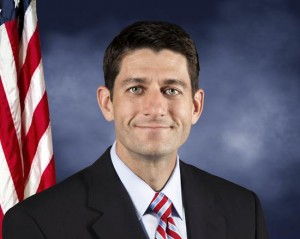By Erik Wasson of thehill.com
The House Budget Committee approved Chairman Paul Ryan’s 2013 budget resolution on Wednesday night in a close 19-18 vote.
Two conservative Republicans voted against the Ryan plan, which cuts spending by $5.3 trillion over 10 years, because they said it did not cut the budget fast enough. Reps. Justin Amash (R-Mich.) and Tim Huelskamp (R-Kan.) voted “no.”
Panel Republicans were unanimous last year in voting in favor of Ryan’s budget, and the tight vote indicates that next week House GOP leaders could face more defections on the floor than last year, when only four Republicans opposed it. GOP leaders say they are confident the measure will pass.
Panel conservatives had wanted to bring discretionary spending down to $931 billion next year as part of a plan to balance the budget within a decade. The Ryan plan contains a compromise spending level $97 billion higher and does not balance until nearly 2040.
House Budget Committee Fiscal Year 2013 Budget
Congressional Budget Office (CBO) Report on Chairman Paul Ryan’s Budget
FY 2013 House Budget Committee on Scientific Research and Financial Aid
With respect to investments in scientific research and student aid, a summary document prepared by the Budget Committee staff includes, in part, the following statements:
- In 2010, the government went from primarily guaranteeing private student loans to lending 100 percent of its student-loan money directly through the Department of Education, turning the agency into one of the largest lending banks in the country… [T]his budget authorizes the use of fair-value accounting principles for any legislation dealing with federal loan and loan-guarantee programs…
- Ensuring educational and job‐training opportunities for a 21st century economy: The government’s well intentioned approach to higher education and job training in America has failed those who most need these forms of assistance. Federal tuition subsidies are often captured by (and to a certain extent drive) rapidly rising tuition costs for those higher education programs that should be the first rung on the ladder of opportunity. Meanwhile, dozens of job training programs suffer from overlapping responsibilities and too often lack accountability.
- This budget ensures higher education assistance programs are put on a sustainable funding path, better focusing aid on those in need and better addressing the root drivers of tuition inflation for all students…
- This budget would continue funding essential government missions, including energy security and basic research and development, while paring back duplicative spending and non-core functions, such as applied and commercial research or development projects best left to the private sector. And it would immediately terminate all programs that allow government to play venture capitalist with taxpayers’ money…
Rep. Mick Mulvaney (R-S.C.) told The Hill that he might vote against the Ryan plan on the floor after supporting it in committee.
To win over conservatives, the budget contains instructions to six committees to find an extra $261 billion in savings over 10 years.
The compromise that Speaker John Boehner (R-Ohio) and Ryan brokered among committee Republicans was tested when Budget Committee ranking member Chris Van Hollen (D-Md.) offered an amendment to return spending levels to those in the August debt-ceiling deal.
The Boehner-Ryan compromise put the spending cap at $1.028 trillion for 2013, a $19 billion cut from the August deal.
“Let’s stick to the deal … what you are doing, it is going to throw the whole appropriations process into chaos,” Van Hollen argued. He said budget talks in the future are going to be even tougher because changing the deal erodes trust.
“Since when did these things become floors?” Ryan countered.
The three appropriators on the committee — Reps. Mike Simpson (R-Idaho), Tom Cole (R-Okla.) and Ken Calvert (R-Calif.), who had fought in recent weeks to keep the level of discretionary spending at $1.047 trillion — all voted with Ryan against the Van Hollen amendment. The amendment failed 16 to 21.
The vote capped an epic markup session at House Budget that lasted nearly 11 hours. During the markup, Democrats threw more than two dozen amendments at the Ryan plan in order to provoke debates on everything from taxes to birth control to the Dodd-Frank financial reforms.
Passions got most heated during a discussion of federal funding of food stamps, which the budget cuts by $133 billion.
Rep. Gwen Moore (D-Wis.) pushed back on rhetoric in the Path to Prosperity that entitlement programs “lull” people into dependency. She argued that most food stamp recipients are the working poor, not long-term welfare recipients, and that is it wrong of the GOP to “vilify” the poor.
Rep. Reed Ribble (R-Wis.) said Democrats have their hearts in the right place but economic growth through tax cuts and by ending regulations is a better approach than entitlement spending.
A glimmer of bipartisanship shone through when Rep. Heath Shuler (D-N.C.), who has been trying to assemble a bipartisan coalition to agree on a deficit-reduction plan based on the recommendations of the Bowles-Simpson commission, tried to get the committee to agree in the broadest terms to a “balanced approach.”
His amendment called for spending cuts and also tax reform that generates revenue. Once Ryan confirmed that this was revenue “statically scored,” or in other words from more than just economic growth, he voted against it.
Rep. Tom McClintock (R-Calif.) argued that the GOP has heard the “siren song” from Democrats before on a deficit compromise, only to end up with tax increases without spending cuts.
Shuler got the support of all Democrats present and Simpson, who has also sought a bipartisan solution as well as Rep. Rob Woodall (R-Ga.). Mulvaney and Reps. Todd Akin (R-Mo.) and Diane Black (R-Tenn.) voted present. The amendment failed by a vote of 15 to 15.
Shuler said that after he retires this year, he expects some members will wake up and realize partisanship is hurting the country.
